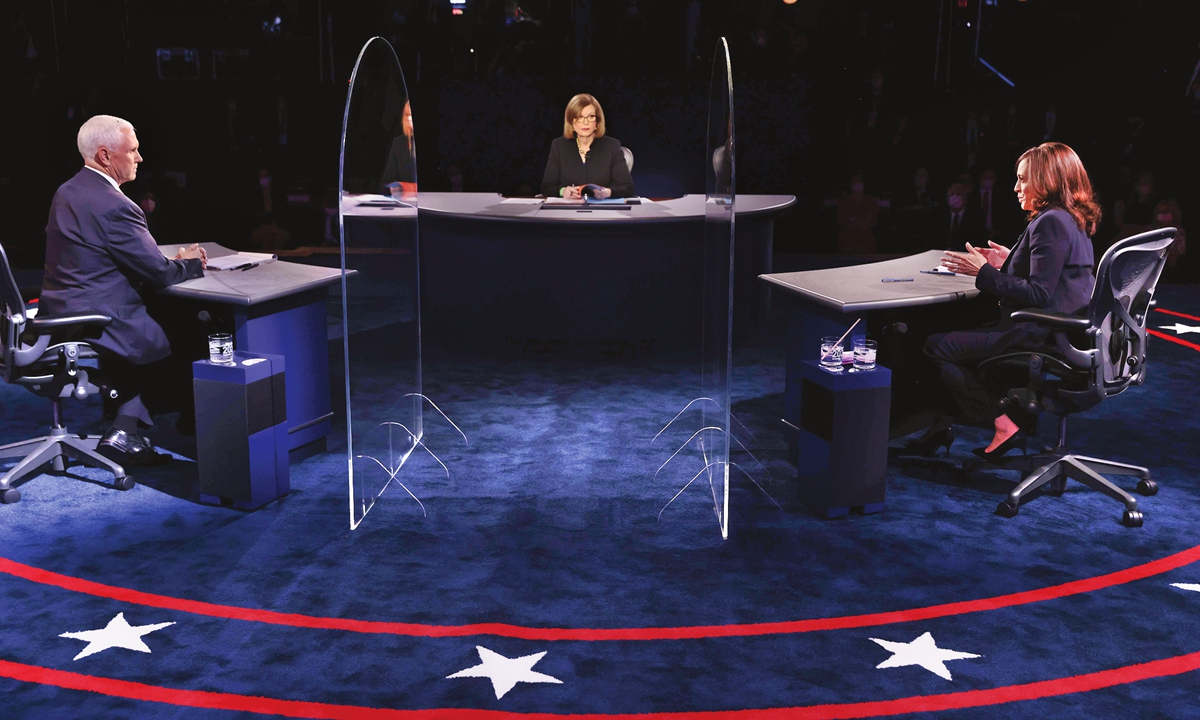US VP candidates dodge China question in debate, signals possible room of moderation in future ties
By Liu Caiyu Source: Global Times Published: 2020/10/8 21:28:40
Both sides want to leave room to moderate ties after election: experts

US Vice President Mike Pence (left) and US Democratic vice presidential nominee and Senator from California Kamala Harris (right) participate in the vice presidential debate in Kingsbury Hall at the University of Utah on Wednesday in Salt Lake City, Utah. Photo: VCG
Both Vice President Mike Pence and Senator Kamala Harris dodged a question on whether they view China as a competitor, adversary or enemy in the Wednesday US vice presidential debate, which analysts consider a sign that both sides want to leave room to moderate relations with China in the future as China-US ties hit their lowest point in decades in the run-up to the US presidential election.
The debate attracted an unusual degree of attention coming after President Donald Trump and many of his inner circle have been infected with the coronavirus. The candidates and moderator were separated by plexiglass screens, though experts said they would probably be of little effect in preventing virus transmission.
After a chaotic first presidential debate eight days ago and Trump's subsequent diagnosis with COVID-19, watchers eagerly anticipated the vice presidential debate, especially as given the ages of the two presidential candidates, some Americans believe that Pence or Harris could be potential acting presidential agents. The vice president is first in line to succeed the president in the US.
But it was more a show for the sake of appearances, some Chinese analysts said after watching the debate, as the first face-to-face debate between Harris, trained as a lawyer, and Pence, a sophisticated public speaker, was eventually upstaged by the buzz of a fly. Some Chinese netizens said neither candidate could be said to be a real winner as little governmental policy was discussed.
China was brought up as expected but both candidates dodged the issue of China-US ties as they avoided answering whether they view China as a competitor, an adversary or an enemy.
Sun Chenghao, an assistant research professor at the Institute of American Studies at China Institutes of Contemporary International Relations, said this can be taken as allowing for space to ease the current tense China-US relations in the future.
During the debate, Pence, following the path Trump established, continued to blame China for US' own pandemic failure, as Trump again hit out at China over the coronavirus on Wednesday, threatening that Beijing will "pay a big price for what they've done to the world."
Lü Xiang, a research fellow on US studies at the Chinese Academy of Social Sciences in Beijing, told the Global Times on Thursday that the Wednesday debate was far more orderly than the presidential debate eight days ago, but disappointing in many ways as it rarely touched on any real policies.
Dominated by the COVID-19 pandemic, the debate that Pence is obviously on the defensive is not likely to add any bonus for the downward trajectory of Republicans in the presidential campaign, he said.
According to a CNN poll after the debate, a majority of Americans polled (59 percent) said Harris won, while only 38 percent said Pence performed better. Most voters who watched the debate said the Wednesday event had not changed their minds about whom to support, the CNN poll reads.
The vice presidential debate was largely upstaged by the fly that landed on Pence's head. Some netizens calculated that the fly was perched on the top of his head for two minutes and three seconds. Some net users joked that the fly needed to go through COVID-19 testing because it bypassed the glass barrier separating the candidate from the host.
Newspaper headline: VP candidates dodge China policy in debate
Posted in: DIPLOMACY